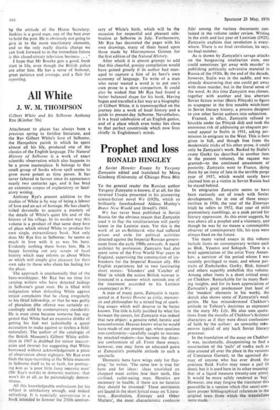Prophet and loss
RONALD HINGLEY
A Soviet Heretic: Essays by Yevgeny Zamyatin edited and translated by Mirra Ginsburg (University of Chicago Press 86s) To the general reader the Russian author Yevgeny Zamyatin is known, if at all, for the inverted Utopia presented in his pioneering science-fiction novel We (1920), which so brilliantly foreshadowed Aldous Huxley's Brave New World and Orwell's 1984.
We has never been published in Soviet Russia for the obvious reason that Zamyatin used it to flay the totalitarianism still partly latent in the Leninist state. Yet this is the work of an ex-Bolshevik who had suffered prison and exile for political activities directed against the Imperial Russian govern- ment from the early 1900s onwards. A naval architect by profession, Zamyatin had also spent some of the First World War years in England, supervising the construction of ice- breakers for the Imperial Russian ally. His English experiences led to two fascinating short stories: 'Islanders' and 'Catcher of Men' in which the native British wowser is trounced in a manner which reminds one of the treatment accorded to his Leninist counterpart in We.
A man of many parts, Zamyatin is repre- sented in A Soviet Heretic as critic, memoir- ist and philosopher by a mixed bag of spark- ling essays which well deserve to be better known. The title is fully justified by what lies between the covers, for Zamyatin was indeed that rare object: a genuine rebel, heretic and nonconformist. Heaven knows what he would have made of our present age, when spurious non-conformity--carefully taught to morons by mischief-makers—has become the drear- iest conformism of all. From these essays, however, one may form an educated guess at Zamyatin's probable attitude to such a spectacle.
'Domestic hens have wings only for flap- ping,' he writes. The same law is true for hens and for ideas: ideas nourished on chopped meat cutlets lose their teeth, like civilised, cutlet-eating man. Heretics are necessary to health; if there are no heretics they should be invented.' These sentiments are fAund in the short lyrical essay on 'Litera- ture, (Revolution, Entropy and Other Matters', the most characteristic confessio fidei among the various documents con- tained in the volume under. review. Writing in the sixth and last year of Leninism (1923), Zamyatin explains that revolution is every- where. There is no final revolution, he says, no final number.
As is shown by Zamyatin's savage attacks on the burgeoning totalitarian state, one , could sometimes 'get away with murder' in publishing politically subversive material in Russia of the 1920s. By the end of the decade, however, Stalin was in the saddle, and was already discovering that one could get away with mass murder, but in the literal sense of the word. At this time Zamyatin was chosen, together with another and less aberrant Soviet fiction writer (Boris Pilnyak) to figure as scapegoat in the first notable witch-hunt in Soviet literary history, a process designed to cow other Soviet authors into subjection.
Framed, in effect, Zamyatin refused to knuckle under (as Pilnyak did) and took the enormous risk of addressing an eloquent per- sonal appeal to Stalin in 1931, asking per- mission to emigrate to the West. This is here given in full, and though free from the modernistic tricks of his other prose, it could only be Zamyatin's work. Backed by Stalin's crony Gorky (as described in another item in the present volume), the request was granted—to the continued amazement of posterity. Zamyatin went to France, dying • there by an irony of fate in the terrible purge year of 1937, which would surely have claimed him as a victim in Soviet Russia had he stayed behind.
In emigration Zamyatin seems to have been curiously out of touch with Soviet developments, for in one of these essays (written in 1936, the year of the Zinovyev trial) he refers to 1932, that year of mild premonitory rumblings, as a peak period for literary oppression. As this error suggests, he was above all a prophet and a visionary, and though he was by no means a contemptible observer of contemporary life, his eyes were always fixed on the future.
The many varied essays in this volume include items on contemporary writers such as Blok, Yesenin and Sologub. There is a brief appreciation of the artist Yury Annen- kov, a survivor of the period whom I was recently privileged to meet, and whose por- traits of Zoshchenko, Gorky, Blok, himself and others superbly embellish this volume. Among other items is a short critical essay on Chekhov. Remarkable for its many flash- ing insights, and for its keen appreciation of Zamyatin's great predecessor (not least of the 'modern' elements in his work), the sketch also shows some of Zamyatin's weak points. He has misunderstood Chekhov's attitude to Tolstoy's doctrines as expressed in the story My Life. He also uses quota- tions from the mouths of Chekhov's fictional characters as if they were direct confessions of faith by the author: an unworthy man- oeuvre typical of any hack Soviet literary processer.
In the translation of the essay on Chekhov it was, incidentally, disappointing to find a resurrection of the 'pails' of vodka such as slop around all over the place in the versions of Constance Garnett, to the agonised dis- may of anyone who has ever drunk the precious fluid. Vedro may mean a pail (it does), but it is used here in its other meaning: that of a liquid measure (twenty-one pints). It would be more safely rendered as 'keg'. However, one may forgive the translator this peccadillo in a version which (for once) con- tains proper bibliographical references to the 9riginal texts from which the translations were made.


































 Previous page
Previous page